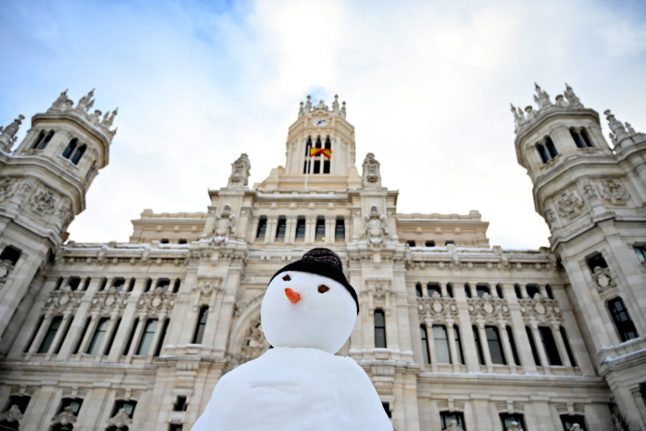Logically, many Spaniards are now talking about how cold it is, so if you’re a Spanish language learner who wants to impress with your command of cold-themed castellano, we’ve got you covered.
¡Hace un frío que pela!
It’s the most common colloquial way of saying that it’s very cold in Spanish.
In the most literal sense, it means ‘it’s so cold that it peels’, an expression which most sources say dates back to 1950 when an expedition climbing the Annapurna massif in the Himalayas noticed that the extremely cold temperatures were making it very easy to peel the almonds they’d brought as provisions.
¡Hace un frío de perros/de la hostia/de cojones/del carajo!
Here are just a few slightly coarser alternatives to un frío que pela, all of which roughly translate to ‘damn cold’ in US English or ‘bloody cold’ in UK’ English.
But don’t worry, as with most Spanish swearwords, you’ll be able to use them in most social contexts without anyone batting an eyelid.
In the literal sense, they mean ‘it’s dog cold’, it’s sacramental bread cold’, it’s ‘as cold as balls’ and ‘it’s f*cking cold’.
¡Qué rasca!
For those of you wondering what rascar (to scratch in Spanish) has to do with the cold, it’s actually an official noun to refer to frost or cold weather.
So saying ¡Que rasca! or hace rasca won’t be met by any bemused stares, it’s just another way to say that it’s very cold.
¡Hace más frío que pelando rábanos!
Here’s one for our readers in Andalusia, a regional expression that means ‘it’s so cold you can peel radishes’, which again means ‘it’s very cold’.
Spaniards certainly seem to notice their food peeling when the temperature drops.
Estoy helado/a or Estoy congelado/a
These are two straightforward ways of saying that you in particular are so cold that you’re frozen. Remember -o at the end of the adjective if you’re a man, and -a if you’re a woman.
If you’re shivering, you can also say estoy tiritando. Funnily enough, you can also say titiritando (with two ‘tis’), a true onomatopoeic version that imitates the shivering.
Nueve meses de invierno y tres de infierno
Here’s a Spanish weather proverb for our readers living in Spain’s interior, which translates as ‘nine months of winter, 3 months of hell’.
Technically it refers to the harsh differences in climate in Spain’s Castille regions, but if your part of Spain has bitterly cold winters and scorching hot summers, this saying is definitely suited to you.
¡Está cayendo la del pulpo!
This is perhaps the weirdest expression on our bad weather list. It literally means ‘the octopus’ one is falling’ but it’s used to say that it’s raining cats and dogs.
The origin of this Spanish saying is just as bizarre as it refers to the act of bashing the octopus to soften its skin before cooking it.
You can also say va a caer la del pulpo if you’re predicting that it’s going to rain very heavily, although there’s nothing to suggest that it can’t be used as well if there’s a snow blizzard.
¡Llueve a cántaros!
This expression is an equally common way to say that it’s raining very heavily.
A cántaro is a jug or pitcher in Spanish, a bit like saying it’s bucketing down in English.
It’s also possible to say llueve a mares, with mares meaning seas, another way of saying that a lot of water is coming down from the sky.
Año de nieves, año de bienes
Here’s a Spanish proverb you can use to talk about all the snow that’s fallen recently. It means that a year that starts off with snow will be one with plenty of goods.
As with previous Spanish sayings about the cold, it has its origins in food and agriculture, as in medieval Spain a year with plenty of snow would keep the ground wet and allow crops to grow.
Nowadays it’s come to mean that a year with a lot of snow will be a lucky one.
Al mal tiempo, buena cara
Here’s a great Spanish proverb to end this list with. It could be translated as meaning ‘when faced with bad weather, put on a brave face’.
Easy for Spaniards to say with their 300 days of sunshine every year.
READ ALSO:



 Please whitelist us to continue reading.
Please whitelist us to continue reading.
Member comments